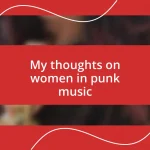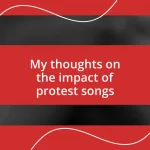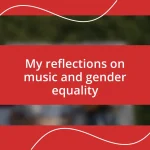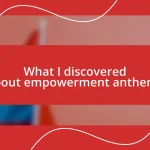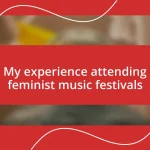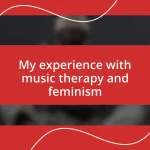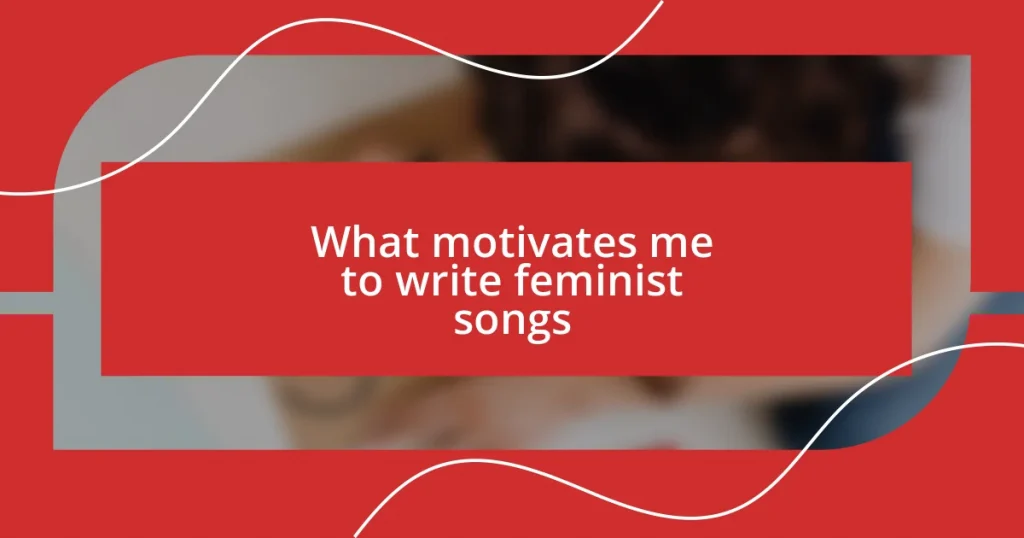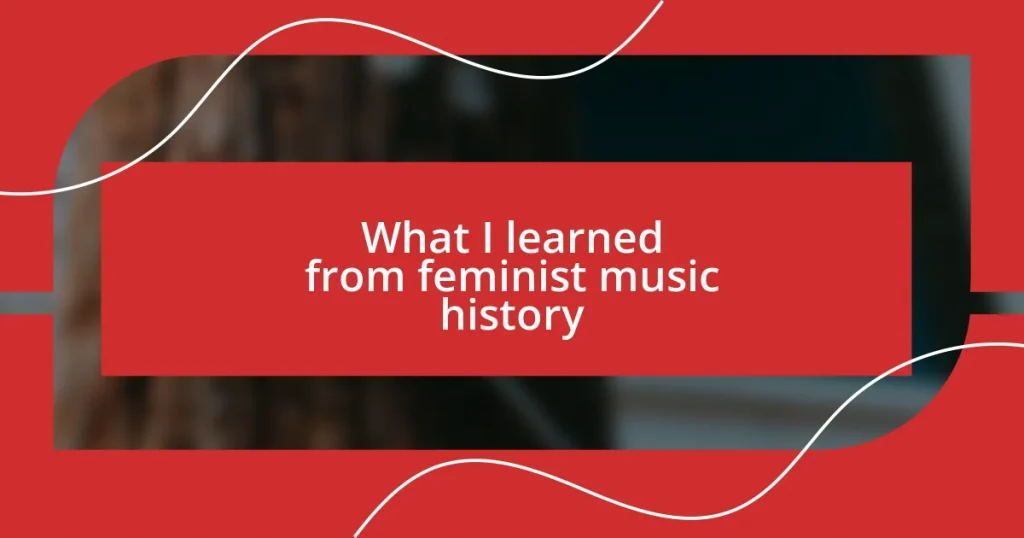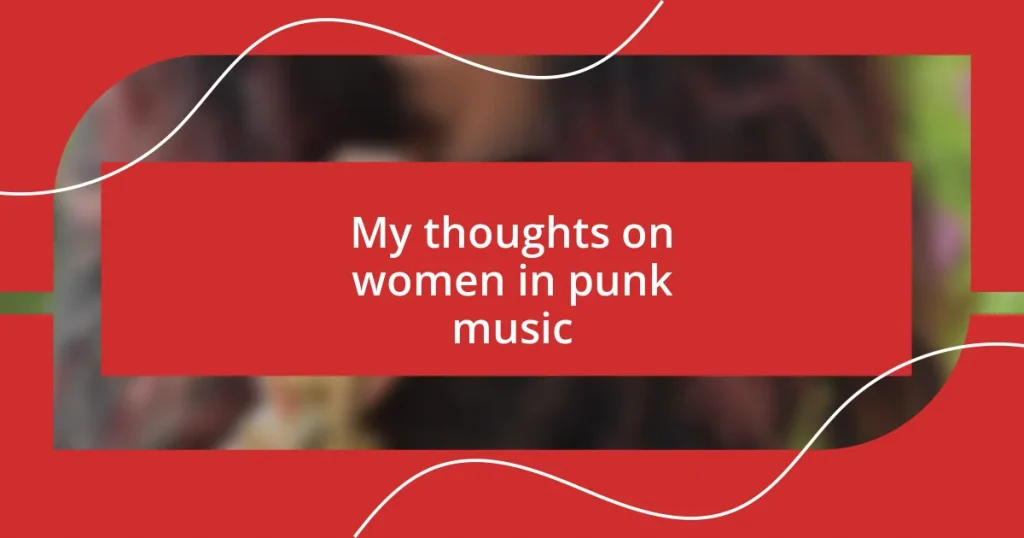Key takeaways:
- Personal experiences and historical influences shape feminist songwriting, emphasizing empowerment and social change.
- Key themes in feminist music include empowerment, intersectionality, and the personal as political, fostering solidarity and personal connection.
- Engagement with feminist communities and vulnerability in songwriting can amplify voices and inspire collective action, demonstrating music’s potential to drive change.
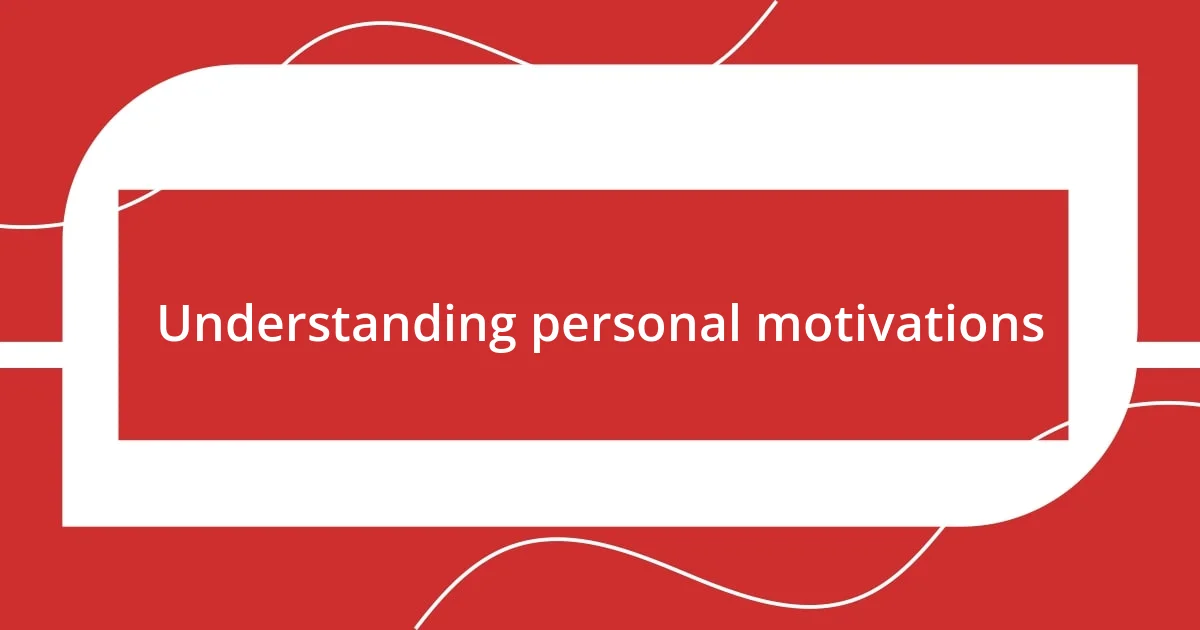
Understanding personal motivations
Understanding personal motivations in writing feminist songs often stems from deeply personal experiences. For me, it was a moment during a high school assembly when a group of girls courageously spoke out about school dress codes. Their bravery sparked something within me. I realized that art could serve as a powerful tool for voicing our frustrations and dreams.
I often wonder: what makes a line resonate deeply with someone searching for their own voice? When I write, I channel the feelings of frustration and empowerment I’ve encountered in various moments of my life, be it from the casual sexism at work or my own struggles with self-identity. Each lyric becomes an extension of those emotions, inviting listeners to reflect on their own experiences and connect on a profound level.
Reflecting on these motivations, I feel a unique sense of responsibility. When I pen my thoughts, I not only express my journey but also create space for others to feel seen and heard. It’s like I’m weaving a collective narrative that celebrates resilience and invites liberation, one song at a time. Wouldn’t you agree that every song has the potential to inspire change?
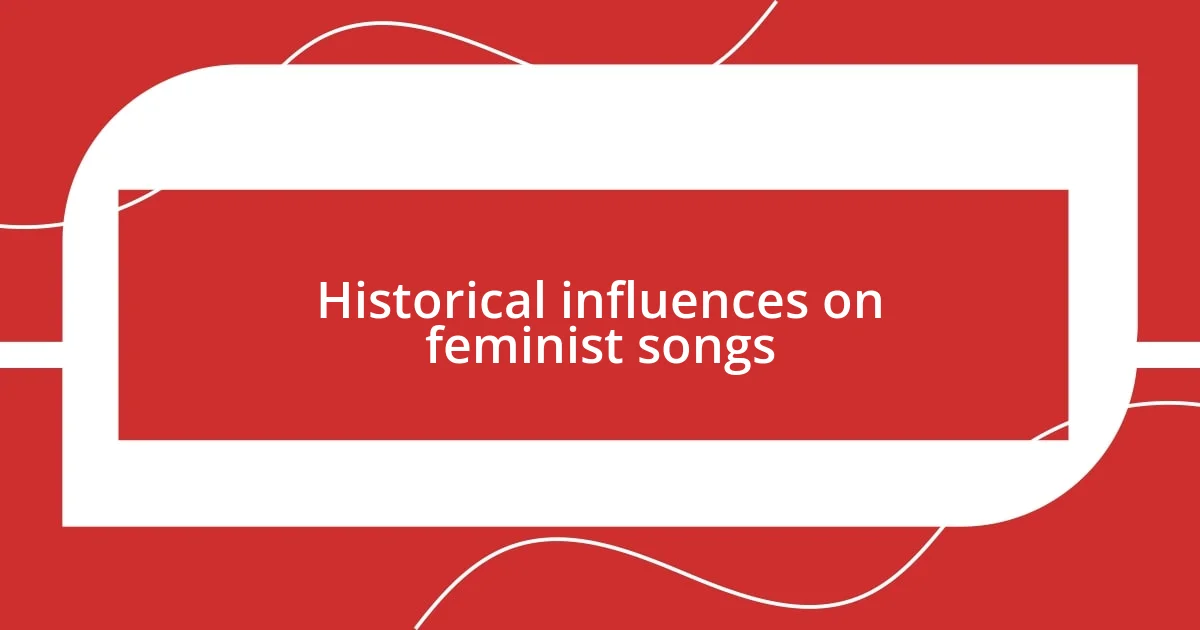
Historical influences on feminist songs
Feminist songs draw power from a rich historical tapestry, often fueled by social movements that have challenged the status quo. For instance, during the 1960s and 70s, the women’s liberation movement ignited a fire within artists to prioritize gender equality in their work. I remember listening to artists like Joan Baez and Aretha Franklin, whose songs resonated with the struggles of their times, making me reflect on how music can be a rallying cry for change.
Here are some key historical influences that shaped feminist music:
– Suffrage Movement (1848-1920): Songs like “Sister Suffragette” became anthems for women’s voting rights.
– Civil Rights Movement (1950s-1960s): Struggles for equality intertwined with feminist themes, influencing artists like Nina Simone.
– Lesbian Feminism (1970s): The emergence of lesbian separatism led to the creation of music that boldly celebrated queer identities, as seen in the work of artists like Holly Near.
– Riot Grrrl (1990s): This punk movement introduced raw, unapologetic lyrics addressing issues like sexual assault and body autonomy, with bands like Bikini Kill leading the charge.
– Intersectionality (2010s-present): Modern artists like Beyoncé and Janelle Monáe explore a blend of race, class, and gender, showcasing the layered experiences of womanhood today.
Reflecting on these historical moments reminds me of the obligation we have as artists. Each song can resonate with the hopes and aspirations of those who came before us. It’s empowering to think that through writing, I might contribute to a legacy that challenges injustice, just like those who inspired me.
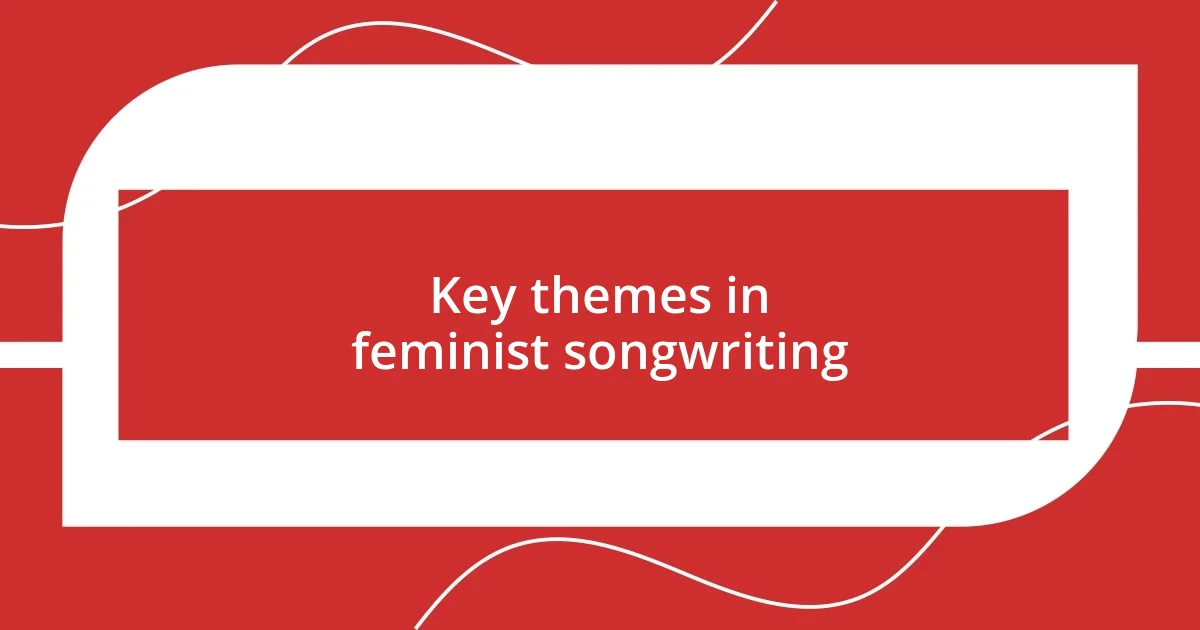
Key themes in feminist songwriting
The essence of feminist songwriting often revolves around themes of empowerment, resistance, and identity. I find that each time I write about the struggles of women, I tap into a deep well of shared experiences. For instance, I once wrote a song about the challenge of being heard in a male-dominated space. The process of putting that feeling into lyrics was cathartic—it allowed me to reclaim my narrative while encouraging others to voice their own.
Another prevalent theme is intersectionality, which speaks to the varied experiences of womanhood based on race, sexuality, and class. I vividly remember my friend, a brilliant queer artist, sharing how her identity influenced her art. It struck me how necessary it is to embrace and highlight these differences in our music. When I write about intersectional experiences, I aim to invite listeners from varying backgrounds into a conversation about shared struggles, hoping to foster solidarity and understanding through lyrics.
Moreover, I can’t overlook the importance of the personal as political. Every song I craft is infused with my own battles and victories. Like when I tackled the issue of body image in my lyrics—I poured out years of self-doubt and criticism onto the page. I believe that when we weave these personal stories into our songs, we not only honor our own journeys but also resonate with others who share similar experiences, creating powerful connections through our music.
| Key Themes | Description |
|---|---|
| Empowerment | Expressing strength and resilience through shared struggles. |
| Intersectionality | Highlighting the diverse experiences of women based on race, sexuality, and class. |
| Personal as Political | Transforming personal stories into broader social commentary. |
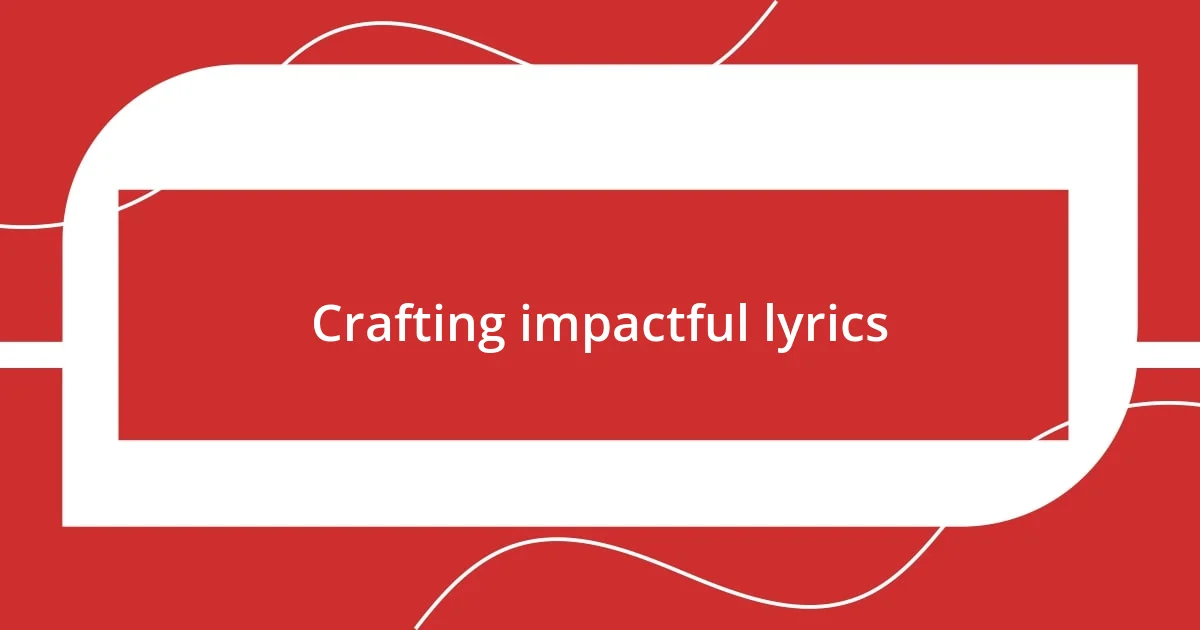
Crafting impactful lyrics
Crafting impactful lyrics is a deeply personal journey for me. Each time I sit down to write, I reflect on my own experiences and the world around me. There’s something magical about turning feelings of frustration or joy into words that might resonate with someone else. I like to ask myself: how can I make this moment felt? When I wrote a song about reclaiming space in conversations dominated by men, I painted vivid imagery based on a confrontation I had. That moment became a powerful anchor in the lyrics, striking a chord with listeners.
I also strive to be unapologetic in my expression. When I decided to write about my experience with misogyny in the workplace, it was scary to lay bare those feelings. But I found that honesty creates a bridge. Through raw lyrics, I invite others to reflect on their stories. The overwhelming responses I received showed me how shared vulnerabilities can spark important conversations. Isn’t it incredible how a single verse can make someone feel seen and validated?
Moreover, I believe rhythm plays a crucial role in delivering impactful messages. I often tweak the melody and beat until it aligns with the sentiment of the lyrics. For instance, while crafting a song about intersectionality, I chose a fast-paced rhythm that mirrored urgency and passion. It felt right to juxtapose intensity with the vulnerability of the words. This blend of melody and lyricism creates an emotional resonance that inspires action, leaving listeners not only contemplating what they just heard but also moved to act.
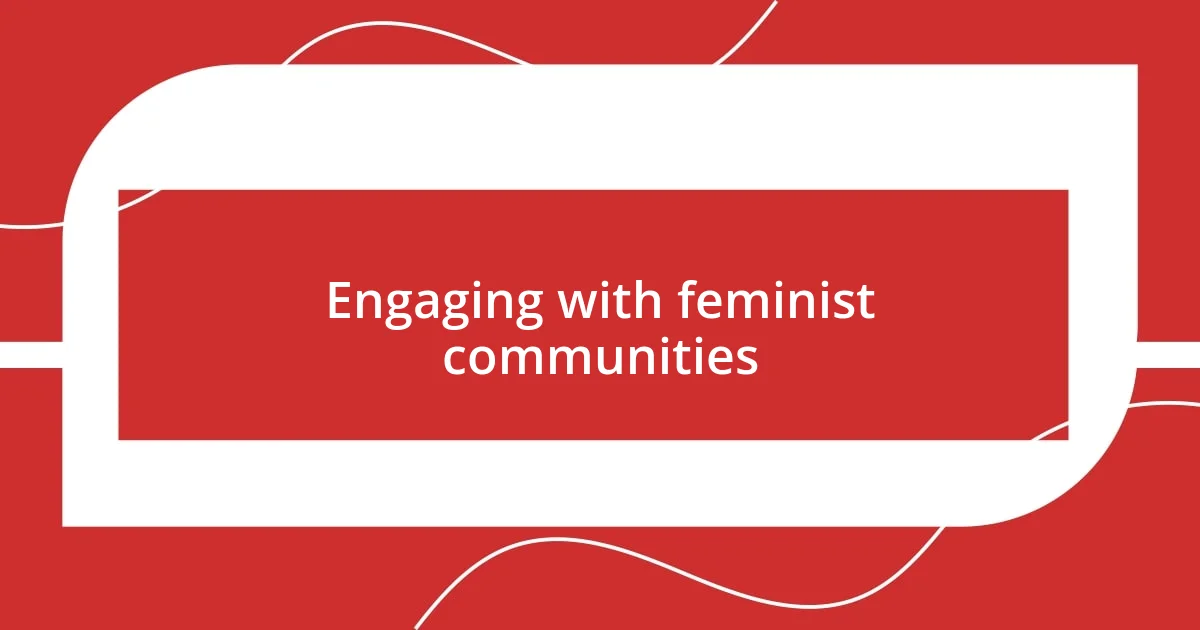
Engaging with feminist communities
Engaging with feminist communities has profoundly shaped my songwriting journey. I remember attending a local feminist music festival and witnessing such a diverse array of talent. It felt electric, sharing stories and connecting with artists who, like me, championed women’s rights through their melodies. Every conversation sparked new ideas, and it reinforced the idea that collaboration can amplify our voices in ways we couldn’t achieve alone.
I’ve also found that participating in online forums has its unique advantages. For instance, while engaging in a discussion about reproductive rights on a feminist platform, I stumbled upon a poignant story from someone across the globe. Her experience inspired me to write a song that addressed the vulnerability many women feel regarding their choices. Isn’t it fascinating how a single narrative can ignite a creative spark that transcends geographical boundaries?
Moreover, being part of these communities serves as a powerful reminder of the importance of allyship and support. When I share my songs at open mic events focused on women’s empowerment, it often leads to exchanges that cultivate a sense of unity. I cherish those moments when listeners share how my lyrics resonated with their own journeys. Isn’t that what we all seek—to connect and uplift one another through our art? These experiences not only validate my work but also deepen my commitment to writing feminist songs that matter.
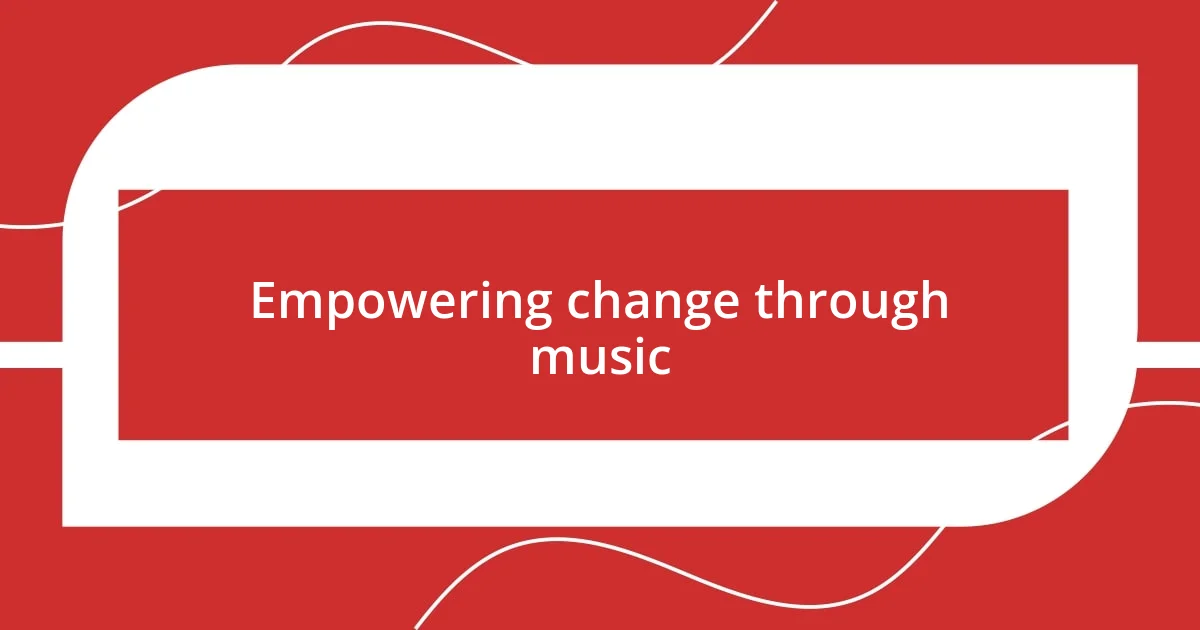
Empowering change through music
Empowering change through music is something I’ve been passionate about for years. I distinctly recall the moment when I performed a song inspired by the #MeToo movement at a small gathering. The energy in the room shifted, and it became clear that my words resonated deeply. It was exhilarating to witness people nodding along, their reactions affirming that music can be a catalyst for change and unity.
I often think about how music can bridge divides and foster conversations that matter. I remember writing a song after a particularly difficult conversation with a close friend about body image. Those raw feelings poured into my lyrics, and performing it felt like a healing process for both of us. When I saw her tear up during the performance, I realized how powerful it is to create art that not only uplifts but also challenges societal norms. Have you ever felt that connection during a song that made you question everything?
In my experience, there’s an undeniable strength in vulnerability. When I sang about navigating the complexities of womanhood while dealing with societal expectations, it opened a dialogue. After the show, women approached me, sharing their stories and struggles. Isn’t it wonderful how music can transform individual experiences into collective empowerment? Each interaction reinforces my belief that art—especially feminist music—can inspire real change in our communities.


